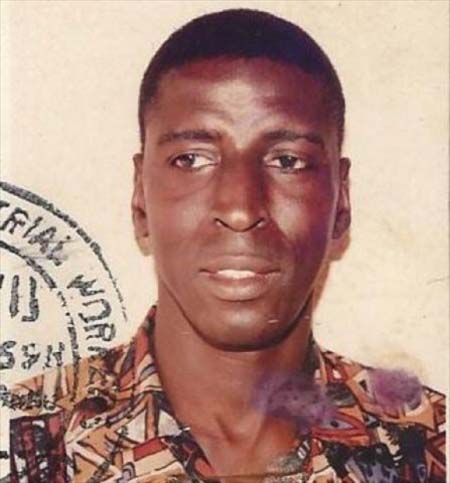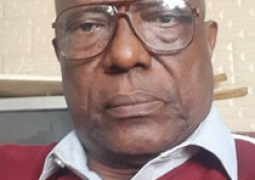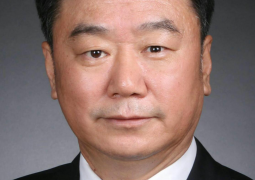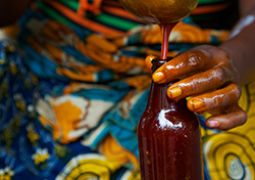
I enjoyed helping my mother in the kitchen. I always fetched water from the village well for her. Washing the dishes, cooking, laundering and pounding coos were also my responsibilities. Sometimes my mother and I helped my father on his farm. I loved my parents a great deal.
But things fell apart when an elderly man, who was my father’s age, visited my father. He asked my mother and me to greet his visitor. My mother entered his hut first and I followed suit. The ugly, big-bellied man smiled when he glanced at me. My father introduced us after we had greeted his visitor.
“I am pleased to meet you, Njillan,” the visitor told my mother.
“The pleasure is mine,” added my mother.
“Nguda, how glad I am to meet you,” the visitor told me.
“Thank you, sir,” I said.
“No, my name is Wally,” he responded. “Call me by my name.”
He was now smiling. My father asked him to stay until late in the afternoon so that he could have lunch. And after he had left, my father told me that his visitor had asked for my hand in marriage, and he had accepted. In fact, my father had already told him the amount of money he should pay as the dowry.
“Nguda, he is a suitor. He is going to be your husband,” my father told me. It was the straw that broke the camel’s back! I could not believe my ears. I could feel tears coming to my eyes. It was not fair, I thought. Marrying a man I saw for the first time; a man I never knew.
And in my mother’s hut, I cried out my heart. She was now consoling me.
“You see, Nguda, I know it is painful but you have to bear,” she said to me. “Your father is that type of person. Whatever he says is final. I cannot do anything about it.”
“How can I marry a man I don’t know? This will only happen over my dead body. I am not an article to be sold out. I will not marry him,” I wept bitterly.
And as days passed, my father summoned me to his hut. He then told me the date on which the marriage was going to take place. I frankly told him that I was not going to marry someone I never knew. His face changed, as anger engulfed him.
“What did I hear you say?” he shouted.
“I am not going to marry him,” he heard me repeat myself.
He slapped me terribly. I ran out of his hut. He ran after me. Yes, he used to be a good runner. He caught and threw me heavily on the ground. He tied my hands and legs with a rope and whipped me severely. My mother came to my rescue.
“Will you marry him?” he shouted at me.
“I will not,” I was heard saying.
He got more annoyed, still beating me. I could feel the whip cutting through my body. My mother went on all fours.
“For God’s sake, Nguda,“ she said, “accept the marriage. It is not worth this.” I still maintained my position. My father was mad with me. My dress was stained with blood.
“Please, Nguda, if you don’t accept the marriage, he will kill you,” said my mother, who was also crying. The beating was so terrible that I had to succumb. “I will marry him,” I finally gave in. My father then untied the rope from me after he had stopped the beating and returned into his hut.
I decided to run to my aunt’s home in another village. I spent some days with her. News reached me that my father had already sent some men to search for me. I told my aunt how I was treated my father. “Hear that,” she stated. “In fact, he told me about the marriage. I totally opposed it. I told him that the days when girls were being forced into marriage have gone. I told him that the new generation will not accept it. There was a bitter argument between me and him. Your father will never change his mind. He sticks to his words.”
“And you cannot convince him to reverse his decision,” I pleaded.
“You see, Nguda, I even quarreled with him about the marriage. I am afraid he will not change his mind,” she told me.
I lost hope because I thought that it was only my aunt who could help me. She really sympathised with me. But what could she do? “This is a problem, Nguda,” she said. “I know it is difficult to marry someone you don’t know and love. But try to bear.”
I was now shedding tears. I wished I had died and left this world forever. My aunt embraced and consoled me. All of a sudden, my father emerged from the gate. He was holding a cutlass. You could see through his face that he was furious.
“I see, you came here to hide. This will not save you from sending you home,” he shouted without greeting my aunt. He pointed his cutlass at me, cursing bitterly.
“Mbanyick,” shouted my aunt. “This is not the way to come to my home. Remember that I am your elder sister, and I will not tolerate those foul words from you. Don’t you see the damage you have done? Look at the injuries you have inflicted on Nguda. Now she lives a miserable life. Because you are her father, this is why you are seizing her right. This is wrong. She has the right to choose the person she wants to marry. I don’t mind you killing both of us, but you will never touch her with your cutlass.”
“Ah! What right are you talking about? A law that has been introduced by the white man! I don’t recognise it. Every time you talk about women’s rights. There is nothing like women’s rights at my home. Nguda, you witnessed the day I beat your mother until she nearly lost consciousness. I swear to the oracle of our ancestors. No woman will utter a word when I speak,” my father stated.
“So you have penchant for beating women. This is your pride. The white man’s law you have mentioned protects our rights as women. Out you go! Will you?” my aunt told my father. I could see him trembling with rage. He left.
In the passage of time, my aunt decided to take me back home. I thought of the consequence. I cried and cried. I knew my father would beat me again. “Here she is,” said my aunt. “You have already planted a knife into her heart by forcing her into a marriage. I will break up our relation if you beat her again. And I will not forgive you if you stand before my dead body when I die.” My aunt later returned home. My father paid heed to what she had told him. He knew she meant it.
It was the wedding day. People turned up in large numbers. There was drumming and dancing. I saw my father being flanked by some men, drinking palm wine. He was dishing out money to praise singers. My mother and aunt were busy attending to people. Some friends of mine were sitting with me. One of the praise singers walked to me and started singing praises. He named a chain of my ancestors, describing them as great and noble. This did not move me at all because I was going to live with a man I never loved.
At my matrimonial home, my husband would force me to go to bed with him. I would not consent but he would batter me until I gave up, and he would rape me. I had to end it all. One day, as he forced me to have an affair with me, I stabbed him with a knife in the neck. He fell and died. I was charged with murder, and I pleaded guilty.
The courtroom was full to capacity. Journalists found some place to squeeze themselves. They strained their ears, using their pens as their weapons to capture the proceedings. Following my plea of guilt, the judge said: “You are hereby convicted. What do you have to say in mitigation?”
A female legal practitioner, who was provided for me by the state, told the court: “My Lord, this young lady was in a difficult and painful situation. She was forced into a marriage she never liked. Circumstances forced her to behave the way she did. But My Lord, you will agree with me that she has not wasted the time of the court and accepted responsibility. I beg this honorable court not to impose the death sentence on her.”
In response, the judge said: “I understand the situation she found herself, but this does not mean that she should take the law into her own hands. I hereby sentence her to death. May her soul rest in peace.”
I saw my mother throw herself on the floor, her hands on her head. She screamed. She had to be helped out of the courtroom.
Read Other Articles In Feature





